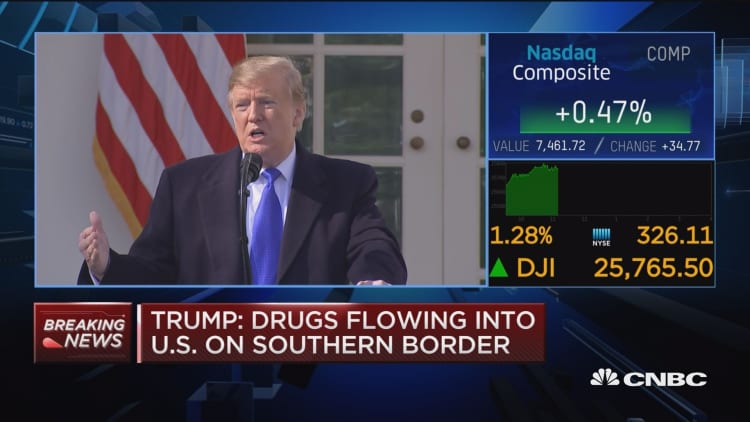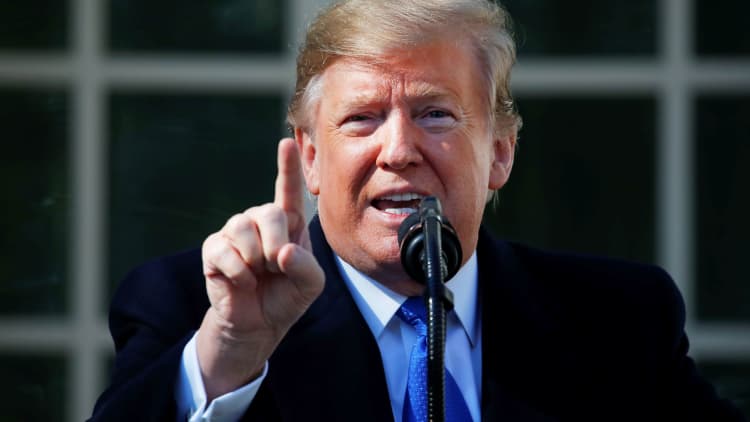President Donald Trump's words are being used against him in a slew of lawsuits challenging his declaration of a national emergency at the southern border.
In at least three lawsuits filed in federal court in recent days, lawyers have seized on the president's remark during Friday's press conference announcing the declaration that he "didn't need to" declare a national emergency.
In suits brought by the Center for Biological Diversity, Public Citizen and 16 U.S. states, the challengers have argued that the president's comments show that his national emergency declaration is a matter of personal preference or a negotiating tactic — not a true emergency requiring the use of American armed forces, as the White House has claimed.

The American Civil Liberties Union, which has said it will file a lawsuit against the administration this week, has featured the president's comment in news releases.
The president's remarks on Friday came after a protracted battle with Congress over his demands for billions of dollars in funding for his proposed border wall.
The tussle led to a partial government shutdown that stretched through December and January — the longest in American history. The issue appeared to be resolved last week only after the president agreed to sign a spending bill without funding for the wall, while simultaneously declaring a national emergency to bypass Congress and unlock already appropriated Department of Defense funds.
"I didn't need to do this. But I'd rather do it much faster," Trump said of the national emergency declaration, speaking from the White House Rose Garden, according to an official transcript. "And I don't have to do it for the election. I've already done a lot of wall, for the election — 2020."
The White House, which did not respond to a request for comment, has said that a national emergency declaration is necessary to address the "situation at the southern border." It argues the situation poses a threat to core national security interests and that a wall is needed to stem what it says is a flow of criminal activity from Mexico.
Following the declaration, the administration has access to $8.1 billion to build a southwestern border wall, including up to $3.6 billion in DOD funds appropriated for military construction, according to a fact sheet prepared by the administration.
But the president's comment, according to lawyers for Public Citizen, "conceded that the situation at the southern border does not require a declaration of national emergency."
"Of the 58 times presidents have previously declared emergencies under the National Emergencies Act, none involved using the emergency powers to fund a policy goal after a president failed to meet that goal through foreign diplomacy (having Mexico pay for the wall) or the congressional appropriations process," wrote attorneys for the Center for Biological Diversity, citing the comment.
And the coalition of states opposing the declaration wrote that the president, while "explaining his rationale" for the declaration, "candidly admitted that the emergency declaration reflected his personal preference to construct the wall more quickly, rather than an actual urgent need for it to be built immediately."

"In his own public statements, President Trump has made clear that his emergency declaration was triggered by his inability to secure funding for the border wall from Congress rather than an actual national emergency at the border," the California-led group of attorneys general wrote in their complaint.
That lawsuit, the most extensive yet filed, cites public statements and tweets from Trump dating to 2014, when he began advocating for a border wall on Twitter.
The "salient facts," the group wrote, including "the historic pattern of unauthorized immigrants committing crimes at substantially lower rates than native-born Americans," have not changed since Trump's inauguration in 2017.
Rather, the states allege that the president's inability to obtain funding from Congress is the reason for the national emergency declaration.
In addition to Trump's comments on Friday, the group of states cited the president's comments to reporters last month in which he said his "threshold" for declaring a national emergency was "if I can't make a deal with people that are unreasonable."
The president said on Friday that he was anticipating a number of legal challenges, and that he expected to ultimately be vindicated by the U.S. Supreme Court.
"Hopefully we will get a fair shake, and we will win in the Supreme Court, just like the ban," Trump said.
The justices upheld a version of the president's travel ban in June 2018 after it was blocked by lower courts. The ban was challenged on the grounds that it was motivated by hostility to Muslims. The top court's reasoning at the time could be good news for the president's national emergency declaration.
In the travel ban case, the state of Hawaii argued that the president's public statements and tweets demonstrated his intent to discriminate against Muslims. But the justices, ruling 5-4 in the president's favor, found that the tweets were not relevant to the case at hand, and instead relied only on the text of the ban itself.
"The issue before us is not whether to denounce the statements," Chief Justice John Roberts wrote in the opinion of the court upholding the president's order.
"It is instead the significance of those statements in reviewing a Presidential directive, neutral on its face, addressing a matter within the core of executive responsibility."


